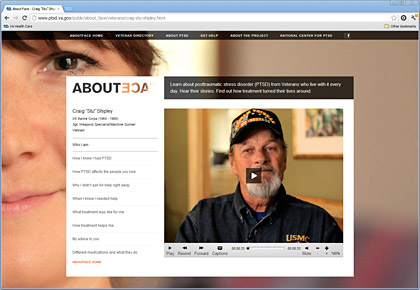
Useful Links
|
PTSD? You Are Not Alone 
September is Suicide Prevention Awareness Month. Know the signs of crisis. 
About Face features videos of Veterans talking about PTSD VA Website Features True Stories from Brave Vets You hear the expression “step up” quite a bit these days. It means putting in extra effort to do that thing a lot of us think about for months, maybe years, but never actually begin. Craig “Stu” Shipley stepped up. In a very personal, very courageous way he will help thousands of his fellow Vets whose journeys parallel his. Stu, a Vietnam Veteran with posttraumatic stress disorder (PTSD), tells his story because he wants Vets with PTSD to know they are not alone. Too many Vets can relate to the dilemma he experienced: “I was sitting down on the mountain with a gun to my head. I wrote the note to my family…and told them how much I loved them.” “I thought no one could understand what I was feeling…and I thought it was a totally hopeless situation. But then I put the gun down, looked at my dog, cried, and started thinking of my sons and my grandchildren. I said ‘I’ve got to try again.’” Yeah. Not an easy tale to tell. For many Vets, it’s as tough, or even tougher than combat. “You think nothing works and you put a gun to your head and that is not the answer…not the answer.” To make sure that struggling Vets know there are others who understand and can help, Stu and other brave Veterans agreed to share their experiences on “AboutFace.” “Hey, if I can save one Vet, this is all worth it.” AboutFace is an online video gallery dedicated to Veterans talking about living with PTSD and how treatment helped turn their lives around. Here Vets learn about PTSD, explore treatment options and, most importantly, hear stories from other Vets like Stu who have faced PTSD and regained control of their lives. Stu smiles as he continues: “I went back to the VA, to the PTSD clinic. This was the turning point for me.” PTSD treatment helped Stu figure out how to get his life back. A truck driver who used to enjoy, even need, that isolation out on the road, Stu now wakes up the in the morning “a little happier, a little calmer, a little more in control.” From his home in the wide open spaces west of the Oquirrh Mountains in Utah, Stu loves his life today and tells Vets, “You can get through this. I promise you.” When asked why he agreed to recount his journey so publicly on a Web site, Stu responds, without hesitation, “Hey, if I can save one Vet. One Vet’s family. This is all worth it.” And what does he advise his fellow Vets? “My advice? Look for peace in your heart and your mind. Seek out the help that is out there for the combat Veteran. “You have to make the first step…no one can do this for you. Magic words will not take it away from you. It will always be there but you can learn to live with PTSD…in peace.” Visit AboutFace and find out how Stu and dozens of other Veterans have taken that first step into PTSD treatment. |
